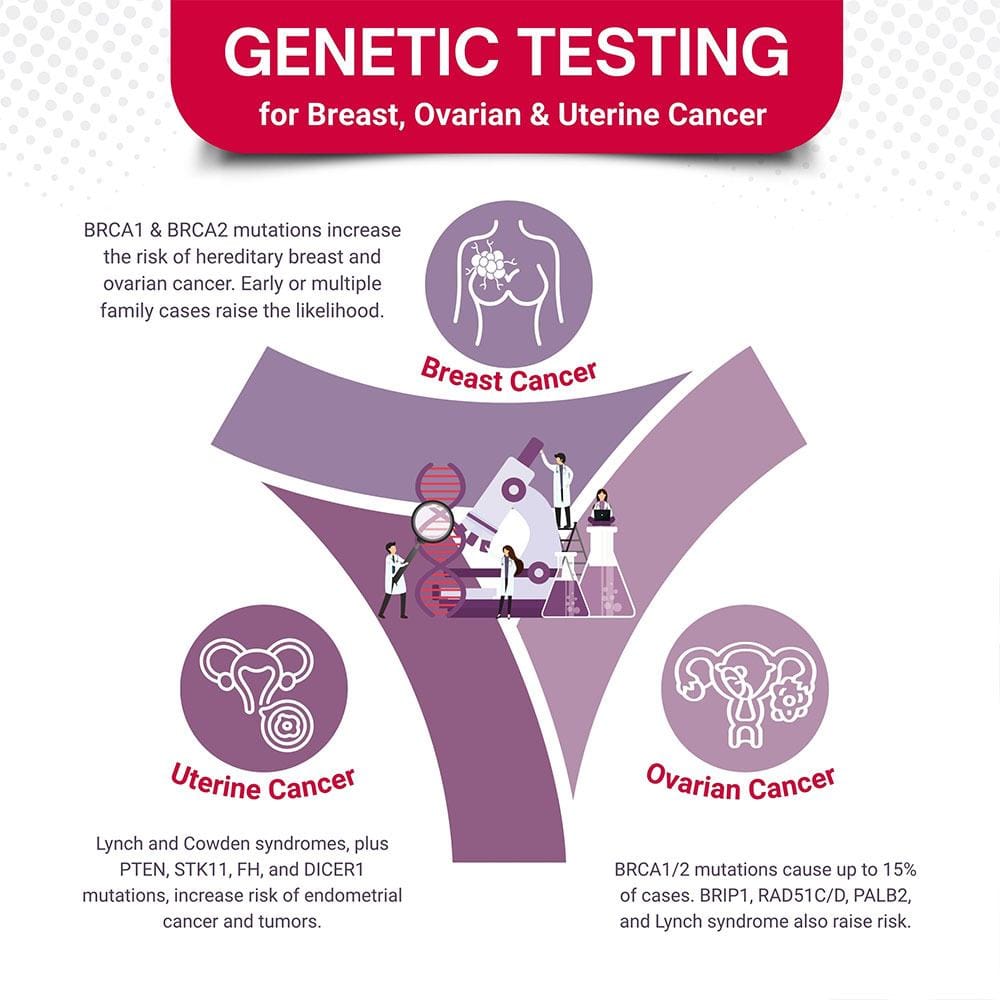What Is Genetic Testing?
Genetic screening looks at your DNA for mutation that relate to certain aspects of your health. A simple swab from the inside of your cheek or a blood test is all that’s needed to access your DNA. Your DNA carries an incredible amount of information about you and your physical make up. Doctors interpret this information to give you valuable insights into your past, current and future health and well-being.
There’s a wide scope of facts that can be gathered from genetic tests, such as:
- Whether cancer runs in your family
- What your chances are of developing conditions like Alzheimer’s
- If something negative in your genes can be passed on to a child
Early cancer detection testing for breast, ovarian and uterine cancers let you know if you’re at a higher risk of developing these types of cancers. It also supplies other data as well. Preconception genetic testing helps you with family planning decisions. BRCA & multi-gene panels give you more information by combining some of the DNA tests. For compassionate, caring genetic counseling in New York City, the team at Cohen Medical Practice (CMP) helps you understand your options and provides the genetic testing you need for yourself and your family.
What Is a Genetic Test for Breast Cancer?
The genetic test for breast cancer has been around long enough for most women to know the most prevalent genetic markers tested: the BRCA1 and BRCA2 genes. Mutations or changes in any one of these genes may tell you if you’ve inherited hereditary breast and ovarian cancer (HBOC) syndrome. Most women with a family history of breast cancer don’t have the hereditary mutation and therefore aren’t at a greater risk of developing breast cancer.
The risk of having HBOC syndrome is also dependent on:
- How close of a relative had the breast cancer — for example, a mother has more of an influence than an aunt.
- How many members of the family have cancer.
- How old a family member was at the time of a diagnosis, as being younger equates to a higher risk of the mutation.
Men can also get breast cancer and if they have a mutation, are at greater risk of both prostate and pancreatic cancers. Women with HBOC have a higher risk of ovarian and pancreatic cancers in addition to breast cancer. To learn more, your doctor may recommend a family risk assessment. The genetic experts at CMP New York interpret the results and suggest a plan for your future health, such as preventive surgery or increased cancer screenings.

What Type of Genetic Test for Ovarian Cancer Is Available?
The genetic test for ovarian cancer is the same as for breast cancer — looking for the BRCA1 and BRCA2 genes. The mutation is responsible for five to 15 percent of all types of ovarian cancers, and a woman with the mutation has a 40 percent chance of developing ovarian cancer in her lifetime.
Other genetic tests for ovarian cancer include looking for:
The gene mutations of the BRIP1, RAD51D and RAD51C genes, which may indicate an increased chance of ovarian cancer
The ATM and PALB2 gene mutations that pose a slight risk for ovarian cancer
Lynch syndrome, a type of colorectal cancer, which gives women a moderately increased risk of uterine or ovarian cancer
But just because you have a gene mutation doesn’t mean that you’ll get cancer. Genetic counseling is recommended so that you know what the results indicate and how that knowledge can impact your future health and possibly the health of your family. Your OB/GYN makes recommendations for additional cancer screenings when you test positive for any gene mutations.
Is There a Genetic Test for Uterine Cancer?
There are genetic tests to determine the chance you have for developing uterine cancer. A Lynch syndrome genetic test for ovarian cancer also can indicate a 60 percent increased chance of uterine cancer. Cowden syndrome, when the PTEN gene mutates, gives a woman a 20 to 30 percent chance of getting endometrial cancer in her lifetime. Other gene mutations may not lead to cancer, but can show a high risk for tumors, fibroids or lesions on your sexual organs.
A genetic test for uterine cancer may indicate high risks when mutations are found, such as:
- DICER1 gene mutations that have been known to cause cancerous and non-cancerous lesions in a variety of organs
- A mutation of the gene STK11 that causes Peutz-Jeghers Syndrome, a very rare ovarian cancer
- Mutations in the FH gene that lead to hereditary leiomyomatosis and renal cell carcinoma syndrome
As genetic testing gets more mainstream, you’ll be able to prepare for and even prevent more illnesses and ailments. Dr. Felix Cohen and his associates in Midtown Manhattan can show you the way through the capital letters and abbreviations of your genes. They explain how and why you may or may not be at risk. The only way to know is to contact CMP New York today for your genetic counseling session and explore the road map to your health.

